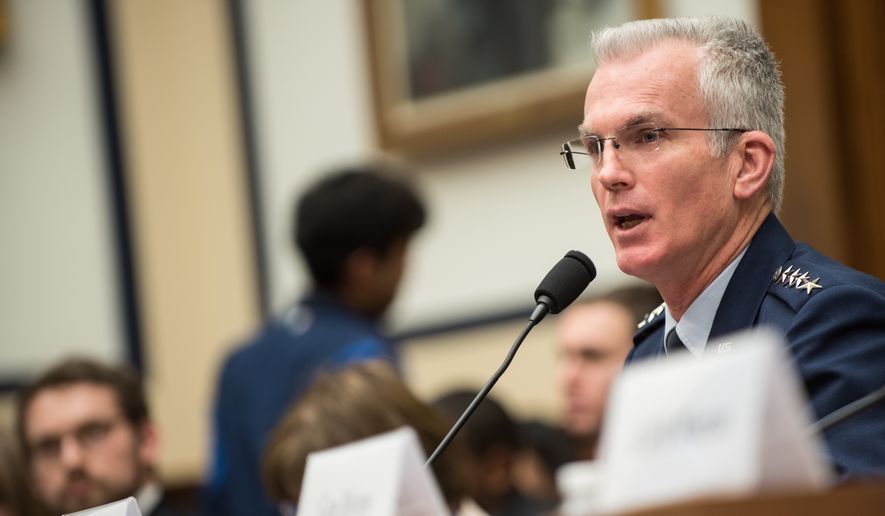The U.S. and its allies in the fight against Islamic State in Iraq and Syria are facing a new headache now that the terror group has been driven from virtually all of the territory it held in the region — what to do with hundreds of terrorist detainees now in custody and whether they can be sent home.
“The [Islamic State] detainees that are in the hands of our partners, and there are several partners in the region, they now number in the hundreds,” Vice Chairman of the Joint Chiefs of Staff Gen. Paul Selva said Tuesday.
“We have engaged in a concerted effort to contact [detainees] countries of origin, to determine whether … they are willing to take them back,” he told reporters during a breakfast in Washington.
Home nations willing to repatriate Islamic State fighters will subject them to prosecution under anti-terrorism laws within those nations, said Gen. Selva That effort, he added, come as the U.S. and its partners confront the threat of that returning foreign Islamic State fighters might try to carry out terror attacks on their home soil.
As its so-called caliphate collapsed under pressure from the coalition, hundreds of Islamic State fighters were rounded up by the U.S.-backed paramilitaries.
A large number of the detainees in Syria are in the custody of the Arab-Kurdish paramilitary coalition known as the Syrian Democratic Forces or SDF. The SDF, with the backing of American artillery and airpower, liberated the Islamic State’s de facto capital of Raqqa from the terror group’s control last year.
Others are being held by Kurdish peshmerga forces and Iraqi security forces, who both freed the northern Iraqi city of Mosul from Islamic State’s grip in 2017.
As Islamic States “caliphate” collapsed under pressure from the coalition, hundreds of Islamic State fighters were rounded up by the U.S.-backed paramilitaries. Until recently, American and coalition commanders have refrained from getting involved with Islamic detainee operations carried out by other nations in the alliance.
A deal Islamic State struck last August with the regime of Syrian President Bashar Assad and Lebanon’s Hezbollah to allow a convoy of Islamic State fighters and their families safe passage from Iraq into Syria drew the coalition’s ire. American warplanes bombed the exit routes around the Islamic State convoy, effectively blocking it from completing its trip into Syria.
As coalition commanders continue to deal with those foreign fighters under detention, they are also taking efforts to track those foreign fighters who escaped the offensives in Iraq and Syria and are looking to make their way back home.
“It is our belief that they are trying to get back to their countries of origin, now what they do when they get back is hard to predict,” Gen. Selva said, noting that many traveled to battlefields in Iraq and Syria under aliases or with dual-nationality passports, leaving little to no trace of their movements.
“The thought that these foreign fighters who have participated in this fight now for some now two years, will quietly leave Syria and return to their jobs as shopkeepers … in Copenhagen, in Munich” is “a very compelling problem,” the general said.
Compounding that problem is Islamic State leadership’s continued ability to use social media and the internet to inspire and coordinate attacks from their redoubts in Syria.
“I do not know if they have command and control, in the way you or I would use those words,” Gen. Selva said, “but their ability to communicate to their followers worldwide is still fairly robust.”
U.S. counterterror experts say thousands of fighters have already fanned out from Islamic State strongholds in Mosul and Raqqa to Europe, Asia and beyond.
The terror group’s prolific propaganda arm has instructed its followers to abandon Mideast battlefields in favor of operations elsewhere. The flood of foreign fighters, combined with self-radicalized operatives, could become a much larger problem for the U.S. and its allies, even after Islamic State’s defeat in Iraq and Syria.
“There still appears to be an ability for ISIS’ core to communicate outside the Euphrates region inside Syria,” where the terror group’s remaining leadership has holed up, Gen. Selva said Tuesday.
• Carlo Muñoz can be reached at cmunoz@washingtontimes.com.




Please read our comment policy before commenting.